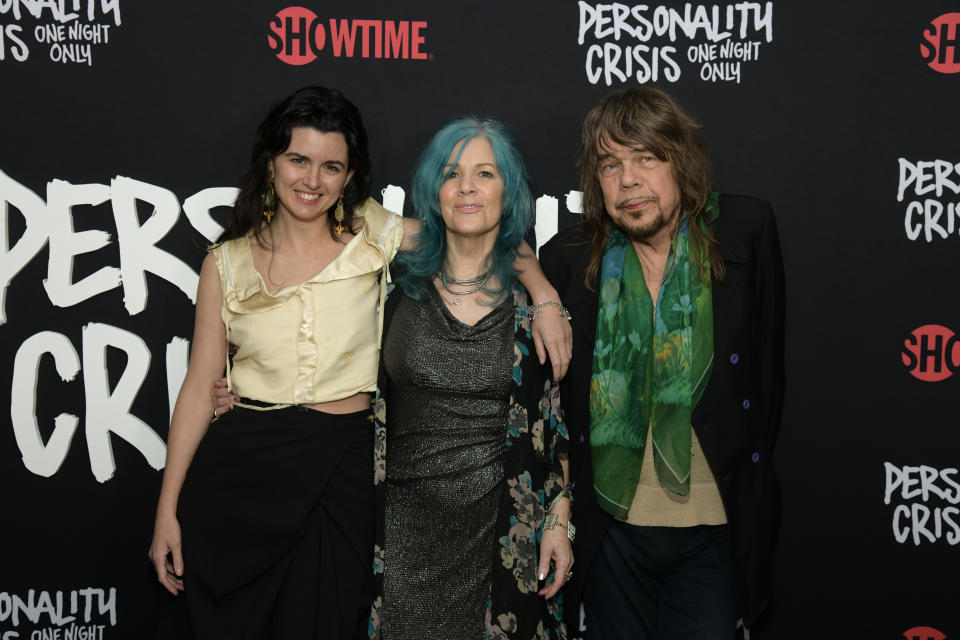Martin Scorsese: ‘The Image on an iPhone Is the New Cinema Vérité’

“Inimitable storyteller” and “mythic storyteller” were a few of the superlatives sung of David Johansen, former New York Dolls frontman turned lounge act Buster Poindexter, at the Metrograph premiere of “Personality Crisis: One Night Only” in New York Tuesday.
But they could easily apply to the film’s co-director, Martin Scorsese, who made the cabaret concert documentary with David Tedeschi, the longtime editor on his past nonfiction music films like “George Harrison: Living in the Material World” and Bob Dylan’s “Rolling Thunder Revue.”
More from IndieWire
RIP Showtime, Buh-Bye BET: Paramount Wants to Get Bigger by Being Smaller
'Yellowjackets' Episode 3 Marks the Beginning of the End for One Character
Curiously for an Oscar-winning filmmaker who has made eight music documentaries along with Fran Lebowitz portraits “Pretend It’s a City” and “Public Speaking” and other nonfiction efforts, Scorsese doesn’t exactly subscribe to the term documentary itself. Or differentiate it from his fiction features like “The Irishman” or the upcoming “Killers of the Flower Moon” at all.
“For me, what I’m trying to do is find a way just to make films so that they’re not put into niches of fiction or nonfiction. The word documentary is outmoded now,” Scorsese said at a Q&A, moderated by Johansen’s daughter Leah, which also included Tedeschi and Johansen himself.
“That has to do with the old black-and-white postwar neorealist cinema, the newsreels, we’re all used to thinking, my generation, that if it wasn’t black-and-white and grainy, it wasn’t truthful. It was, except that now that’s been supplanted by high-def TV. The image on an iPhone. That’s the new cinema vérité,” Scorsese said.
Such frank comments aren’t surprising from the director who, when last presenting “Personality Crisis” at the New York Film Festival, dissed the American obsession with box-office numbers. His thoughts on filmmaking are as of their time and ahead of their time as ever.

Kristina Bumphrey/SHOWTIME
“The thing about it is, yes, there are certain kinds of nonfiction films with journalistic subjects that deal specifically with history — of music, sport, whatever — but I’m trying to find something where they’re just movies, and they slip in and out of each other and they affect each other,” he said, adding that even in the edit or structuring of a film, he doesn’t differentiate between narrative or nonfiction.
“I still fall into the trap of A, B, and C in a narrative film. I don’t like it but often, with narrative film, if you are telling a story, you need to hit certain story points to let the audience know what you’re doing. I try to find ways to get around that and allow you to feel the story without telling you the story.”
In the case of “Personality Crisis,” Scorsese said that came from the music. It’s the film’s centerpiece, as Johansen plays a one-night cabaret show at the Cafe Carlyle in New York as Buster Poindexter, while covering his own New York Dolls songs from decades earlier, but with a moodier, bluesy twist. Throughout the club performance, Scorsese and Tedeschi interweave stories of how the New York Dolls came to be as the founders of punk across decades of love, loss, drugging, and drinking.
Scorsese and Tedeschi decided to make the film after seeing Johansen/Poindexter’s act in New York and said, “Let’s make a movie.” But as they started to map the film out ahead of COVID, Scorsese wondered, “Is it going to be just, simply, solely the cabaret act itself? I said, ‘Let’s shoot that and begin.’ That’s what happened with ‘The Last Waltz.’ We just decided to record the concert for history.”
“Personality Crisis” features some talking-head style interviews — if you can call them that, as they’re really more poetic, free associations — with Johansen, but they’re conducted by his daughter Leah. “If he gets annoying, he’ll get annoyed at her, which is great. And it’s family, keep it in the family,” Scorsese thought at the time. Johansen is hilariously irascible throughout, calling his lifetime a “maimed happiness” after a William Blake quote.
Though we have no way of knowing exactly what Scorsese means until the film drops at Cannes this May, Scorsese sees “Personality Crisis” as a kind of musical companion to his Osage Nation murder saga “Killers of the Flower Moon” — in the same way “Rolling Thunder Revue” and “The Irishman” were, and both released on Netflix the same year. Scorsese acknowledged that Johansen’s radio show “Mansion of Fun” certainly inspired the “Killers” soundtrack.
“Music has always been the inspiration for a kind of provocation that forces you to think another way,” he said. “As far as the two styles are concerned, the two types of pictures, they’re the same. That’s not literally true, but in my mind, that’s true.”
“Personality Crisis: One Night Only” premieres on Showtime April 14.
Best of IndieWire
New Movies: Release Calendar for April 14, Plus Where to Watch the Latest Films
From 'Nymphomaniac' to 'Little Ashes': Unsimulated Sex Scenes in 40 Films
Quentin Tarantino's Favorite Movies: 51 Films the Director Wants You to See
Sign up for Indiewire's Newsletter. For the latest news, follow us on Facebook, Twitter, and Instagram.


